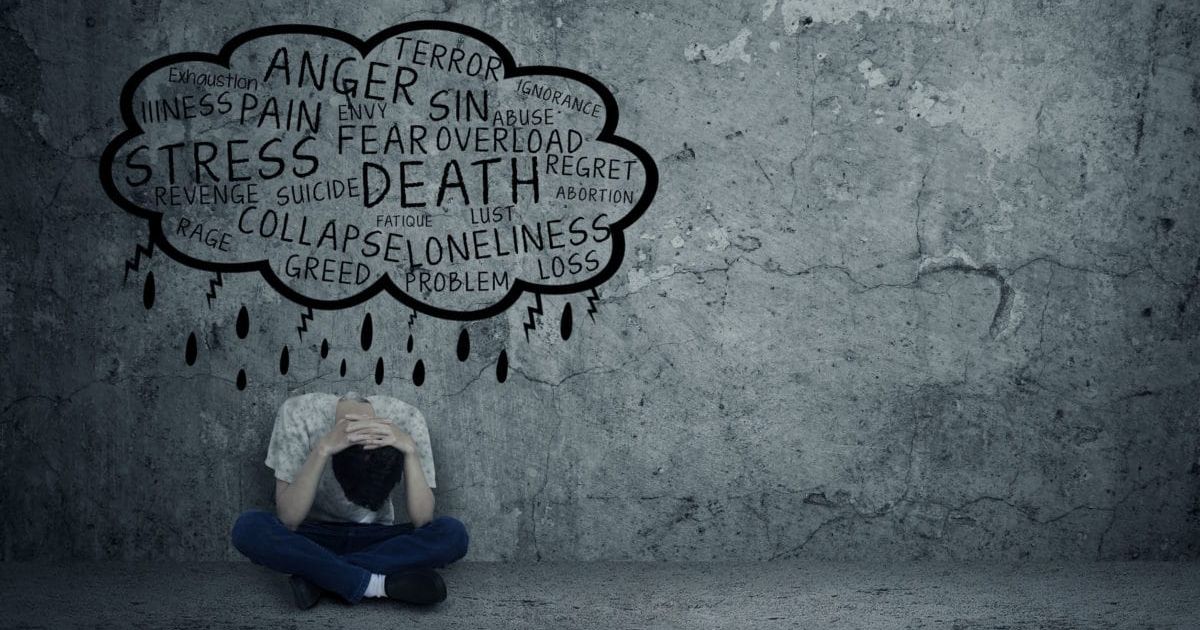Early Warning Signs Of Mental Illness
Mental illness can cause an affected individual's life to spiral out of control. This is because mental illness affects thoughts, feelings, behaviors, and general interactions with the world and oneself. When things feel off or especially challenging in the areas of thoughts, feelings, behaviors, and interactions with the others, it is time to consider these early signs of mental illness to take charge of the situation and reverse it before it gets worse. It is important to receive professional help in the form of a counselor, therapist, or doctor.
Be Aware Of The Warning Signs Of Mental Illness

Individuals suffering from similar mental illnesses will display similar thought, emotion, and behavioral patterns. These distinctive patterns of thought, emotion, and behavior do not begin as severe, but gradually become that way over time. There are hints, sometimes subtle, of underlying mental illness. Symptoms are felt by the sufferer but not observable by others, whereas signs of mental illness are observable by an objective third party. The following early warning signs of mental may indicate the presence of mental illness but bear in mind these signs alone do not necessarily warrant a diagnosis of mental illness. Everybody experiences rough patches in life and may experience similar symptoms. The test of whether these signs indicate true mental illness is whether they originate from within the person and whether they exhibit these signs on a continuous basis.
Get a brief overview of mental illness in young children first.
Warning Signs Of Mental Illness In Young Children

There are over tewo hundred recognized and classified forms of mental illness that can be developed at any age. They tend to be due to genetics, biochemical imbalances, and environmental factors such as excessive stress, or a combination.
The warning signs of mental illness in children are severe and frequent temper tantrums, disobedience, aggression, hyperactivity, excessive anxiety, persistent nightmares, poor grades or changes in school performance, and changes to sleeping or eating routines. However, there is no need to worry if children only show one or two of the symptoms, but if symptoms begin to get worse or they develop other symptoms, parents should seek a mental health professional.
Read an overview regarding mental illness in older children and adolescents next.
Warning Signs Of Mental Illness In Older Children And Adolescents

As children age, they may begin to display different symptoms as they deal with a mental illness. The most common include substance abuse at a young age, outbursts, intense fear, changes in sleeping and eating habits, defiance of authority, and display an inability to manage responsibilities.
When children begin to reach adolescence they may begin to show the previous symptoms as well as some others, including social withdrawal, depression, confusion, excessive fears, anxiety, anger, delusions, hallucinations, and suicidal thoughts. If any of the severe symptoms are present, individuals should seek help from a mental health professional immediately.
Dive into more detail about the early warning signs of mental illness now.
A Drastic Change In One’s Sense Of Self

A stable personality indicates healthy thought processes, emotions, and behaviors, as well as a strong sense of self and one’s place in the world. When a person experiences a drastic change in their sense of self, a fundamental change in one’s identity, this could be an early sign of mental illness. Gradual changes in personality throughout an individual's lifetime may be a natural experience as they undergo new life-altering experiences, but for a healthy individual, a strong sense of self will remain. Potential issues arise when an individual is unable to cope with or adjust in a healthy way to the changes taking place, and they begin to lose their sense of self. A drastic change in an individual's sense of self may require professional intervention.
Get more details on early symptoms of mental illness now.
A Warning Sign Of Mental Illness May Include Psychosomatic Troubles

Psychosomatic troubles are physical symptoms caused by mental conflict and stress. Sometimes individuals visit their physician for persistent headaches, aches, and digestive issues that may be caused by psychological disturbances. In these instances, the symptoms may sometimes be relieved temporarily, but they rarely go away completely. Difficulty managing stress is also a common symptom, as are increased anger and irritability. Sometimes what was originally only physical illnesses can result in psychosomatic troubles if the stress experienced due to the physical illness is not dealt with in a healthy manner.
Learn about shifts indicating the presence of mental illness now.
Changes in Sleeping And Eating Patterns

An early sign of mental illness also includes major changes to sleeping and eating patterns. If an individual was previously an early riser and loved waking up early in the mornings to catch the sunrise, but suddenly and inexplicably finds themselves waking up much later, this could be an early sign of mental illness. Of course, it could also be a sign of exhaustion and overwork or physical illness, but if the latter two are ruled out, mental illness may be the reason for it. Major changes in eating patterns are also a potential sign. If an individual was accustomed to eating about two thousand calories per day but suddenly and inexplicably began consuming four thousand calories (or significantly less than two thousand) daily, it might be an early sign of mental illness assuming other factors are ruled out.
Discover more serious early warning signs of mental illness now.
Avoiding Activities One Used To Enjoy

Avoiding activities one used to enjoy may be an early sign of mental illness. Spending time partaking in healthy activities is a mark of a healthy person, and vice versa, avoiding them may indicate something is wrong. In addition to avoiding once enjoyable activities, feeling a sense of shutting down and withdrawing from society and life in general, may also be an early sign of mental illness. Of course, spending time alone may be essential for recuperating after an illness or intense period of activity, but if there seems to be no reason for the feeling of shutting down and avoiding people and activities, it may be a sign of early mental illness. There may also be the feeling that problems and struggles are getting worse and not better, and an overall focus on negative feelings and experiences.
Dive into one of the most serious indicators of mental illness now.
Suicidal Feelings And Thoughts Are An Early Sign Of Mental Illness

Healthy individuals who cope with the normal difficulties and stress experienced in life in healthy ways usually do not experience suicidal feelings and thoughts. Suicidal feelings and thoughts may be experienced by those failing to cope with their problems in a healthy way and who are unable to see a healthy way out of their problems. Individual experiencing these issues should get emergency professional help immediately. Suicidal thoughts and feelings are known to the individual experiencing them but may also be observable by third parties through vague statements made. Sometimes those with suicidal feelings and thoughts make comments about not being able to go on in life, or that the world would be better off without them, or by giving away their favorite belongings.
Get more information regarding early warning signs of mental illness now.
Excessive Fear Or Worrying

Excessive fear or worrying can be a sign of a developing anxiety disorder. Depending on the type of anxiety disorder, the fears may be related to certain situations or behaviors, or they may occur during everyday life. Generalized anxiety disorder is a mental illness that causes patients to feel unnecessary anxiety and catastrophize about simple life situations. Panic disorders cause more acute physical symptoms than anxiety attacks. They may make affected individuals feel like they can't breathe or are having a heart attack, and they can cause paralyzing fear. However, panic attacks tend to end within about ten minutes, while generalized anxiety permeates each aspect of an affected individual's thoughts. Obsessive-compulsive disorder is a type of anxiety disorder that causes compulsions patients feel they must follow or they'll experience extreme anxiety. This condition can also cause obsessive, panicky thought spirals that feel uncontrollable and irrational.
Learn more about mental illness symptoms now.
Increased Issues With Concentration

Increased issues with concentration can be a sign of multiple mental illnesses. The most commonly acknowledged low-concentration disorder is attention-deficit hyperactivity disorder, which makes it difficult to start or finish projects, keep track of time, and focus on general tasks. Though these symptoms tend to be present from childhood, some patients aren't diagnosed until they reach adulthood. If an individual is experiencing increasing concentration problems where they didn't previously have any, it could be a sign of a neurological issue with their memory processing, though it can also be a symptom of depression. Anxiety also interferes with the brain's ability to focus and retain information.
Keep reading to uncover more detailed information about the early warning signs of mental illness now.
Difficulties With The Perception Of Reality

Many mental illnesses cause difficulties with an individual's perception of reality. These perceptions can vary widely in presentation. For example, with anorexia nervosa, patients may have a skewed sense of their own body and weight. The same is true with body dysmorphic disorder, which occurs when an affected individual has an irrational hatred for and problem with some part of their body that causes emotional and social problems. Other perception issues may occur with a patient's thought processes or sensory information. Psychotic disorders are any mental illnesses that present with psychosis, which is a disconnect between reality and perception. Hallucinations may occur in schizophrenia, in which patients see or hear things that aren't actually there. Delusions, or incorrect and irrational beliefs, may also go hand-in-hand with schizophrenia. Delusions of grandeur and paranoia are common with manic episodes of bipolar disorder. Schizophrenic individuals may also have trouble formulating their thoughts and communicating effectively.
Unveil additional warning signs of mental illness now.
Extreme Changes In Mood

Extreme changes in mood can be an early sign of mental illness, especially if they seem to occur with little to no prompting. Manic depression, also called bipolar disorder, classically presents with alternating periods of extremely elevated mood and extreme depression. Manic episodes cause increased impulsivity and can come with emotional highs like euphoria, anger, or sometimes both. Traditional bipolar disorder has highs and lows that last months or even years, but rapid-cycling bipolar disorder occurs when there are four or more episodes per year. Ultradian rapid cycling bipolar disorder can sometimes be caused by medication side effects and lead to multiple mood swings per day. Another mental illness that causes extreme mood swings is borderline personality disorder. Individuals with this condition often have tumultuous, codependent, conflict-filled relationships because they have trouble maintaining a sense of self when alone. Other disorders, such as intermittent explosive disorder, might occur with explosive and irrational bouts of anger followed by relative calm and shame.
Read more about the early symptoms of mental illness now.
Heightened Sensitivity

Heightened sensitivity can be an early sign of certain mental illnesses or neurodivergences. Increased emotional sensitivity is sometimes present in individuals with anxiety disorders or mood disorders like depression. A depressed individual may be more prone to feeling hurt by teasing and other behaviors intended to be harmless. Meanwhile, patients with anxiety disorders are sometimes hypersensitive to criticism. Increased sensitivity to sensory stimuli is important to note too. Autistic individuals tend to experience sensory overload because their brains don't filter sensory information the same way a neurotypical person's does. Sensory overload can also occur in those experiencing pain, fatigue, or confusion from other mental illnesses.